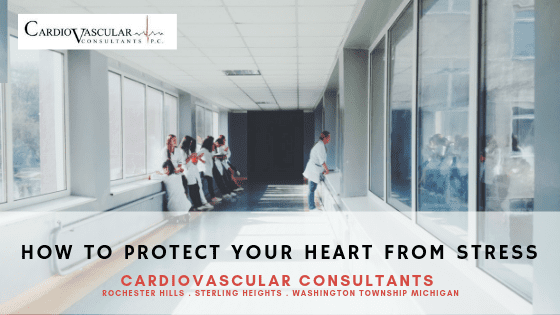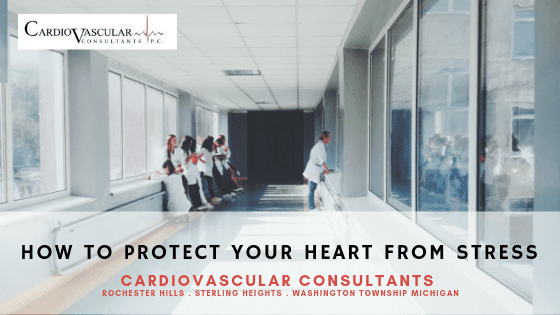Stress is the usual physical and psychological reaction to the necessaries of life. A little amount of stress can be useful and motivate you to increase the performance. However, a higher amount of stress can be harmful to health. More stress comes from unwanted and multiple challenges of life.

The burst of hormones released by the body when the brain perceives a threat. These hormones lead to a fight-or-flight response to deal with the threat and also increases your blood pressure.
Various health conditions occur as a result of stress. Stress has different effects on everyone. Everyone feels stress, and everyone has way to deal with stress. It is very critical how someone reacts to stress.
Generally, excessive stress leads to many health-related problems such as hypertension, irritable bowel syndrome, ulcers, and asthma.
Stress management is a useful tool to keep your body and mind ready for the alarming conditions. Resilience can be developed by practicing stress management. If you have no idea how to manage the stress, then your body might be at high risk to develop chronic stress and severe health problems.
Stress always harm your relationships, quality of life, and most importantly your health. So, it would help if you practiced stress management techniques to cope with the stress.
Stress and Your Heart
Heart diseases are one of the leading cause of deaths in the world. Stress is one of the reasons for stimulating heart problems. Stress affects the various factors and behaviors that enhance the risk of heart diseases like high blood pressure, smoking, physical inactivity, and high cholesterol levels.
To deal with the stress conditions, many people choose to smoke, take drugs and drink alcohol, but these approaches to cope with stress are unhealthy and causes an increase in blood pressure and damage the artery walls as well.
The overall effect of the stress to the body is alarming. It might cause stomach pains, headache, back pain, and most importantly, stress can make your body weak, causes lack of sleep and forgetful and out of control.
These all are the chain of events that happen during the stress condition when body secreted adrenaline that increases the blood pressure and boost up your heart rate.
In a state of constant stress, your body remains in a state of high and negatively affect your various functions. But, the link between stress and heart remains unclear.
Management of stress and prevention of heart disease
Stress management is the best idea for overall health. Different research these days finding the ways to effectively manage the stress for heart diseases. Some researchers suggest that a variety of therapies and treatments can work in decreasing the stress that causes cardiovascular diseases.
Using social and psychological aspects of psychological therapies can show promising results to prevent the second heart attack. Usually, after stroke and heart attack, people become anxious, depressed, and under lots of stress. So, to come out of these unwanted conditions, you must talk to your healthcare professional for the management of such conditions.
Things you can do about stress
Some excellent ways to deal with stress include developing a positive attitude, quit smoking, eating a balanced diet, maintaining a healthy weight, and not drinking too much coffee help you to reduce the stress. People following these things are on the right path to manage the stress.
In most of cases medicines, help to manage various conditions. But, medicines might not work for reducing stress. Tranquilizers usually used by many individuals to calm them down immediately. However, the use of tranquilizers for the long term is not recommended for stress management. The important thing is to relax and learn stress management techniques. Most people confuse anxiety with stress. If you feel anxiety, then you must consult your doctor. Also, find out the ways how stress affects your health and your heart and pushes you down.
Things most people do under stress
- Overeating or eating nothing
- Eating and speaking very fast
- Smoking and drinking alcohol.
- Do not work or work too much
- Sleeplessness or sleep too much
- Slow down
- Show no interest in activities once love them
If you find yourself in any of these conditions, that means you are not adequately dealing with the stress as you need to do.
Protect your heart by reducing stress
Increasing stress with the passage of time affect the heart and can cause increasing cardiac risk.
Stress comes from challenging situations mainly contribute the cardiovascular symptoms and may increase the risk of a heart attack. Along with stress, depression, anxiety, hostility, social isolation, and anger also affect cardiovascular health. Different studies show their contributions to cause heart problems such as,
Workplace stress
Workplace stress mostly affects women and women having stressful work have 40% more chances of heart diseases than colleagues having less stress. Men often feel stress at the workplace when they feel they are not getting enough rewards according to their abilities and efforts.
Financial stress
Men feel more stress due to financial problems. Financial stress damages the heart more than any other stress. Research shows that the rate of heart attack increases in men has shares in the stock market. That can be due to unpredictable ups and downs that affect their financial status.
Disaster-related stress
After the attack of September 11, 2001, many surveys of mental and physical health show that stress level increases in many individuals and increases the blood pressure and leads to a heart attack. Earthquakes also triggers stress-related heart problems.
Stress-easing strategies
You cannot change the activities and world around you, but you have to change yourself or your habits to lower the stress levels. So you can make some changes or plan activities to reduce the risks of heart diseases due to stress.
- Exercise
- Identify what’s causing stress
- Learn time-management skills
- Confront stressful situations head-on
- Build strong relationships
- Walk away when you’re angry
- Rest your mind
- Get the help of a psychologist
- Get enough sleep
- Learn relaxation techniques
Call now (586) 698-1200 to schedule an appointment with a Cardiologist in Sterling Heights, Washington Township or Rochester Hills, Michigan.





